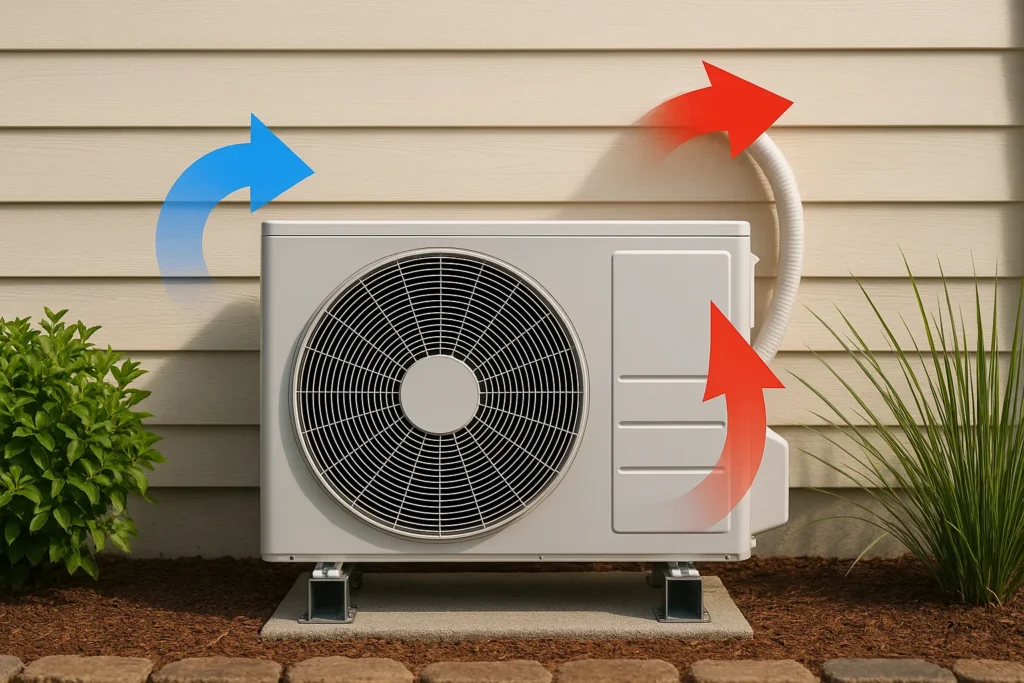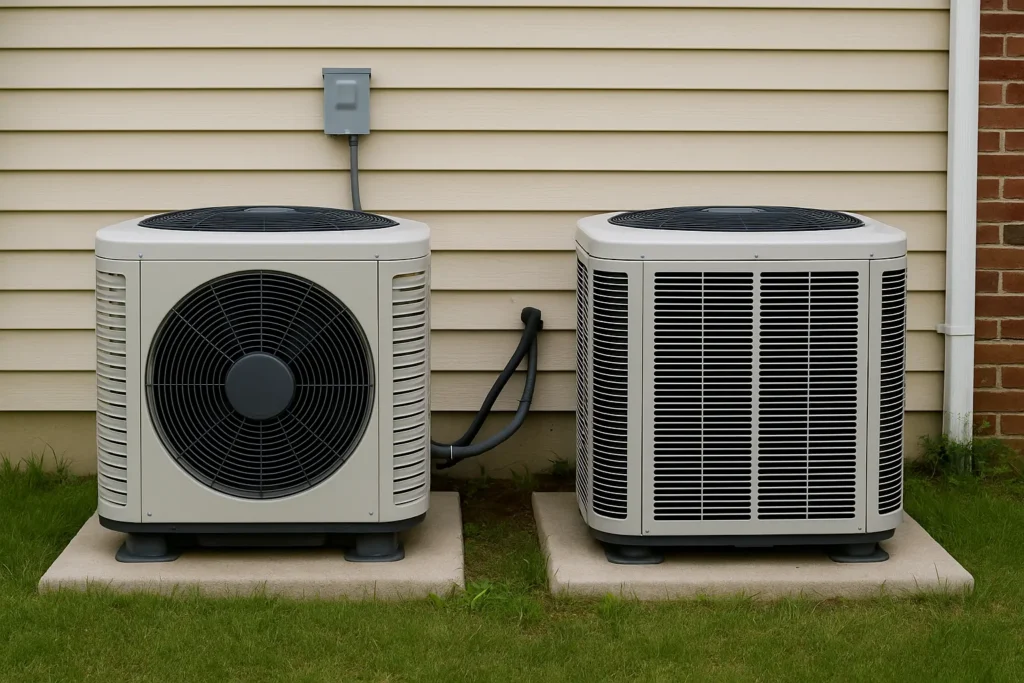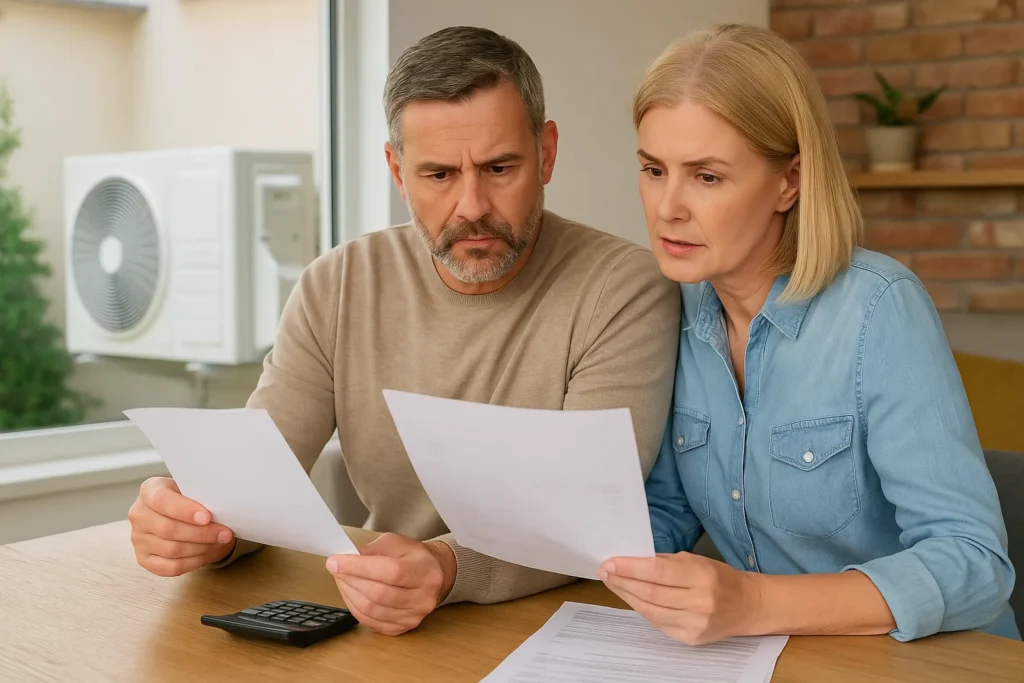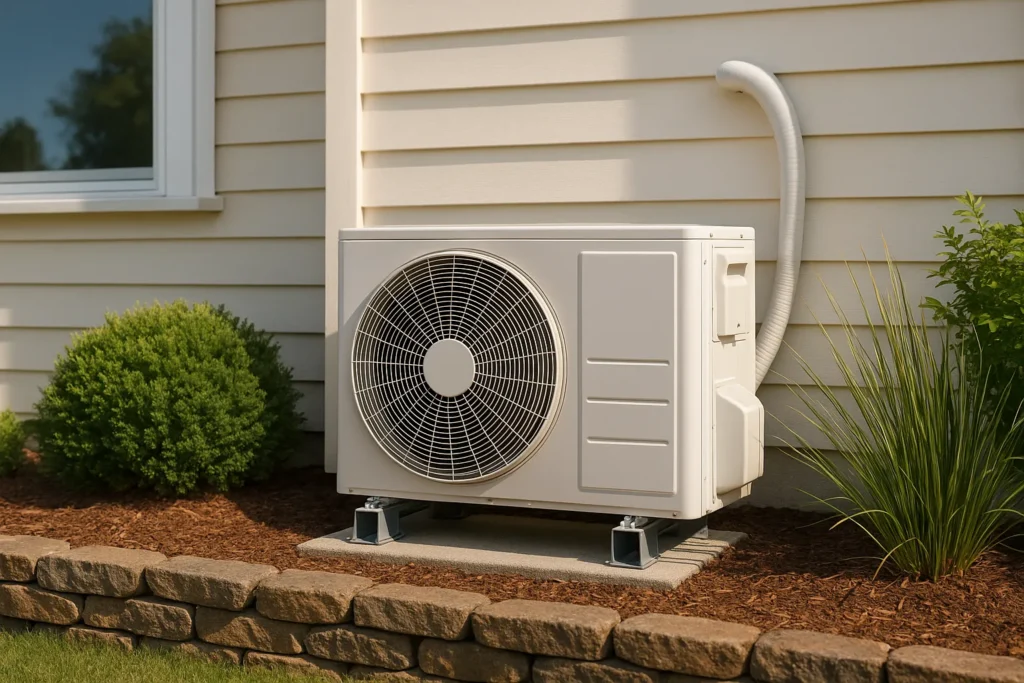Are you confused about heat pumps? Don’t worry, you’re not the first person we know who is.
A lot of people worry about installing them in older homes, switching from gas, or whether or not they work in the cold. But the thing is, heat pumps don’t make heat like your furnace does. Instead, they move heat from outside into your home.
In this article, we’ll explain how they work. You’ll also learn what that means for your wallet, your comfort, and your energy-efficient home.
Let’s start with how heat pumps work and why people often get them wrong.
How Do Heat Pumps Work? (And Why the Confusion Happens)

Heat pumps work by moving heat from one place to another instead of generating it. They transfer thermal energy rather than burning fuel to create warmth. This makes them far more energy efficient than traditional systems.
Here’s what you need to know about how they operate and the different types available:
Transferring Heat
Think of heat pumps like your refrigerator working in reverse. Your fridge takes heat out of the inside and pushes it outside through the back coils.
Heat pumps do something similar for your home. They pull heat from outside air or the ground and move it indoors during winter. In summer, they reverse the process to cool your space. This transferring system is why they’re so efficient.
Air Source vs. Ground Source Heat Pumps
Air source heat pumps are the most common type because they’re cheaper to install. They extract heat from outdoor air and cost less to install. These systems also work well for most homes and climates.
Ground source or geothermal heat pumps work differently. They use pipes buried underground to pull heat from the earth. So the ground stays at a stable temperature year-round. But the downside is: installation costs are much higher because of all the digging.
Heat Pumps for Hot Water and Whole Homes
Hot water heat pump systems are becoming more popular. They can be two to three times more efficient than standard electric water heaters. Also, some systems now combine home heating, cooling, and hot water in one unit.
Many homeowners also love having a single system that handles everything. You get year-round comfort without needing separate equipment for heating and cooling. Plus, you save space and reduce energy usage across the board.
Why the Myths Persist

So why do people still get confused? Part of it comes from mixing up heat pumps with air conditioners. We can’t blame them, as they look nearly identical from the outside.
The main thing that sets them apart is the reversing valve, which lets heat pumps switch between heating and cooling modes.
Older heat pump models also gave the technology a bad name. Back then, the systems struggled in cold weather and made more noise. Modern heat pumps have fixed these problems. Because they now work efficiently even in freezing temperatures and operate about as quietly as a refrigerator.
Next, let’s talk about the efficiency claims, which sound great, but what about actual costs?
Long-Term Costs and Efficiency of Heat Pumps: What Homeowners Need to Know

We’ve covered the upfront costs, so let’s look at what you’ll actually spend over 10-15 years.
Energy Efficiency and Cost in the Long Run
The Coefficient of Performance (COP) explains why heat pumps save money. For every unit of electricity used, you get three to five units of heat output. So if a heat pump with a COP of 4 delivers 400% efficiency, you’ll find that $1 of electricity produces $4 worth of heating.
If you compare that to electric heaters at 100% efficiency or gas boilers at around 90%, the math works in favour of heat pumps.
The initial costs might be higher, but the running costs drop by 30% to 50% yearly. So, most systems pay for themselves within five to eight years through energy savings.
Retrofitting vs. New Builds
Now it’s a given that older homes will need more preparation work. You may require electrical panel upgrades, ductwork modifications, and improvements to weatherproofing and insulation, depending on the condition of your home.
But modern homes already have proper insulation and electrical capacity, which makes installation simpler. Still, your outdoor unit needs careful placement: keep it away from bedrooms, allow airflow, and maintain 30–50 cm clearance.
Maintenance, Lifespan and Warranty
Heat pumps typically last 10 to 15 years with proper care. Ground source systems tend to last even longer (20 to 25 years). And some underground components can function for 50 years or more. You can keep your heat pump running longer than this with regular maintenance.
The most important part of maintenance is to schedule professional servicing twice a year to keep your system running smoothly. In the months between professional checks, you can change filters regularly and keep the outdoor unit debris-free.
Pro tip: Warranties typically cover parts for 5 to 10 years, with compressors often having separate 10‑year coverage. If you skip scheduled maintenance, you risk losing these warranty protections, so document all services.
Integrating Solar for Maximum Savings
Did you know you can pair a heat pump with solar panels to significantly cut your energy bills? During the day, your solar panels can produce free electricity for your heat pump, and the batteries will store any extra energy for later use.
Make an Informed Decision on Heat Pumps
Heat pumps make a lot more sense now, right? The main thing to remember is that heat pumps move heat instead of creating it from scratch, which is why they’re so much more efficient than a traditional heater or air conditioner.
You can start by getting personalised performance estimates for your home and comparing several systems before choosing. Most installers offer free quotes, which makes this step easy.
Ready to take the next step? Head over to Eco4theWorld to learn more about your options.

